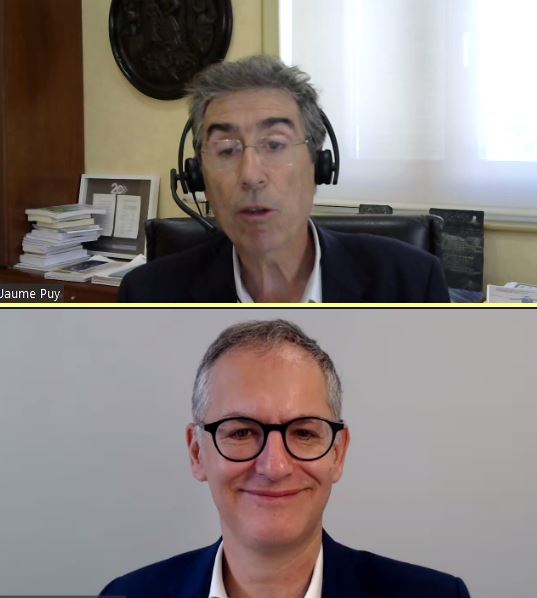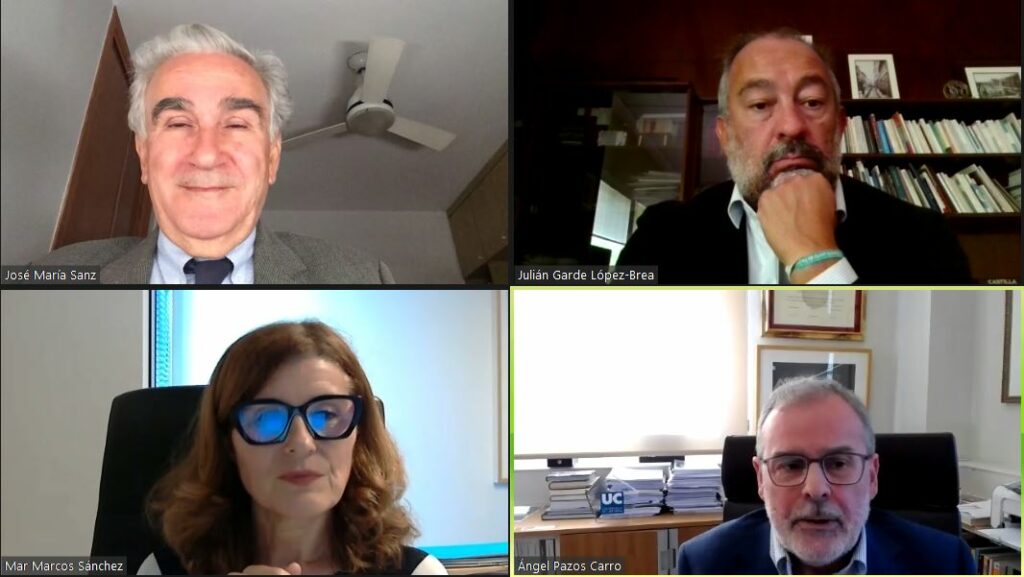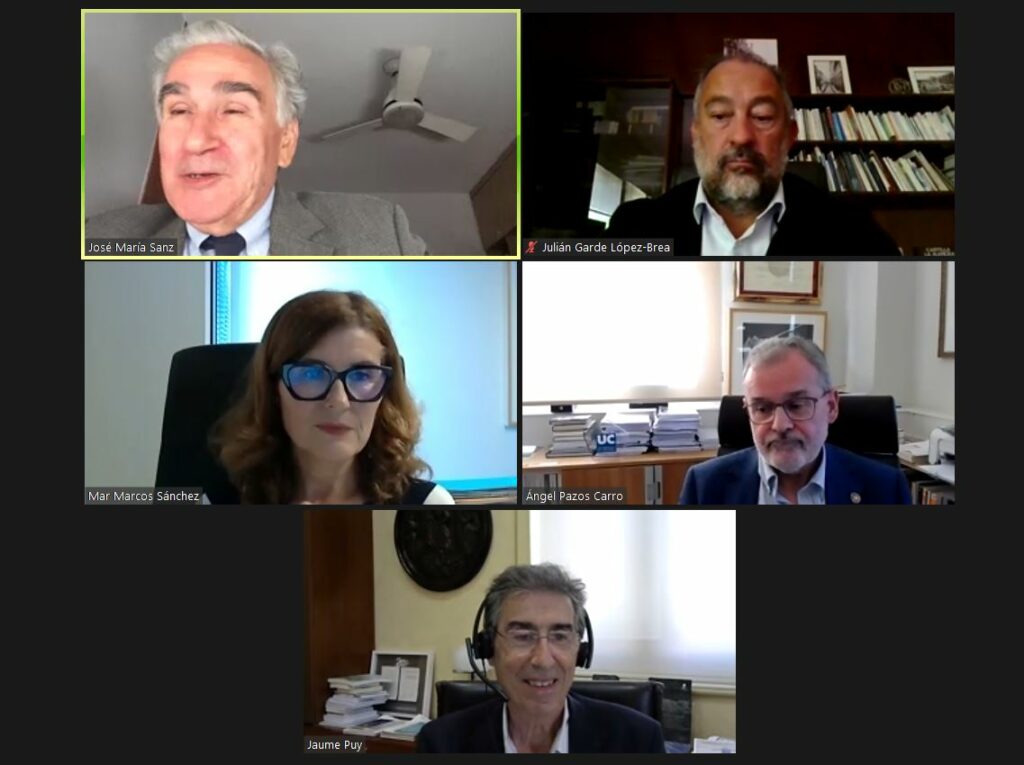Madrid, October 3, 2022
Crue Universidades Españolas organized the webinar “The future of doctoral training in Europe” on October 3, to address the current opportunities and challenges for doctoral education in Europe and in Spain.
The meeting was chaired by the Prof. Jaume Puy, Rector of the University of Lleida, member of Crue’s Standing Committee and representative of Crue in the Council for Doctoral Education of the European University Association (EUA-CDE). After highlighting the importance of quality doctoral training for future professors and researchers at our universities, Rector Puy highlighted the importance of training these doctoral candidates in transversal skills that will enable them to face the challenges of current research.
Following the presentation of the seminar, Rector Puy introduced Dr. Alexander Hasgall, Head of the Council for Doctoral Education of the European University Association (EUA-CDE), who presented the report Doctoral education in Europe: current developments and trends, published by the EUA in April 2022. In his opinion, in Europe everyone with institutional responsibility on Doctoral education currently faces the challenge of having to prioritise the multiple needs that the future development of this training requires.

On the one hand, regarding the survey data presented in the report, Hasgall explained that a certain degree of homogeneity was highlighted with regards to the key priorities of Doctoral training: the quality of supervision and the training of supervisors (54%); adequate funding for doctoral students and doctoral schools (41%); the improvement of conditions for doctoral students to acquire international experience and to attract doctoral students from other countries (40%) or the promotion of ethics and integrity in research activity (35%). Hasgall highlighted the growing concern on the mental health of doctoral students (17%), although there is a need to engage in a more detailed analysis on the structural aspects that cause them, or the uncertainty on their future professional careers, among other.

On the other hand, Alexander Hasgall explained that, with regards to the provision of compulsory transversal complementary training, most of it focuses on research ethics and research methodologies. In the case of the optional offer, he highlighted the growing importance that scientific communication and dissemination are acquiring across Europe. In this sense, he pointed out that rather than expanding the training offer, a reflection should be made on its future and its objectives. Finally, he pointed to the need to broaden the vision and analysis of Doctoral studies to include the postdoctoral stage and concluded by recalling some changes introduced by the pandemic that should be taken into account in the future development of this training, such as the processes of digitalization within universities and their implications for Doctoral Education.

After the presentation, Alexander Hasgall and Jaume Puy discussed some of the hottest topics in doctoral training in Europe today, including: the evolution of supervision models (more open, collaborative, team models) that facilitate the acquisition of transversal and multidisciplinary skills; the training of doctors in international co-tutelles, which would favor harmonisation and institutional cooperation; or the training of supervisors, and the quality of doctoral training, which, they warned, require resources.
Debate on doctoral education in Spain
Following this first part, Crue organised a roundtable on ‘Doctoral education in Spain: challenges and opportunities for Spanish universities’ which was moderated by José María Sanz, Executive Vice President of Crue. Rectors Ángel Pazos and Julián Garde, who preside Crue’s Sectorial Commissions for Learning and Teaching and Research an Innovation respectively, and Mar Marcos, President of the Spanish Conferencia de Directores de Escuelas de Doctorado (CDED).

During his speech, Rector Ángel Pazos pointed to the change in the model of doctoral training in Spain, which has moved from a system essentially focused on the research project, to another one that incorporates a more structured methodology. In this new model, he signalled the importance of acquiring additional transversal skills. Rector Pazos pointed out to the need of advancing in this direction, trusting that the quality assurance procedures really serve to evaluate the quality of the training of doctoral candidates and do not add to QA bureaucratic processes.
Rector Julián Garde added that the current process of amending Royal Decree 99/2011, which regulates the official doctoral studies in Spain, makes this moment for reflection and debate on the subject timely and relevant. Rector Garde highlighted that it is essential to adapt the regulatory framework to the current situation of doctoral studies and highlighted the need to address issues such as supervision of the overall funding of doctoral contracts.
For her part, Mar Marcos, President of the CDED, stressed that all parties involved in doctoral training should assume the changes that have occurred in recent years. She added that accreditation and quality assurance procedures need to be simplified and should focus on the evaluation of training results. Finally, she underlined the importance of greater professionalisation of the staff of Doctoral Schools; of developing procedures to avoid plagiarism and unethical behaviour in research activity, or of developing a European strategy to address the mental health of doctoral candidates.
The participants agreed on the need to carry out an analysis of the results and progress of doctoral training since the approval of Royal Decree 99/2011 with the aim of generating a quality training model that addresses current and future challenges. They convened that the goal is for doctoral training to be attractive, recognised and valued by society. Crue’s representatives in this meeting considered that a joint reflection by all agents involved is needed and affirmed that Crue Spanish Universities is available for its member universities to advance in this regard.


